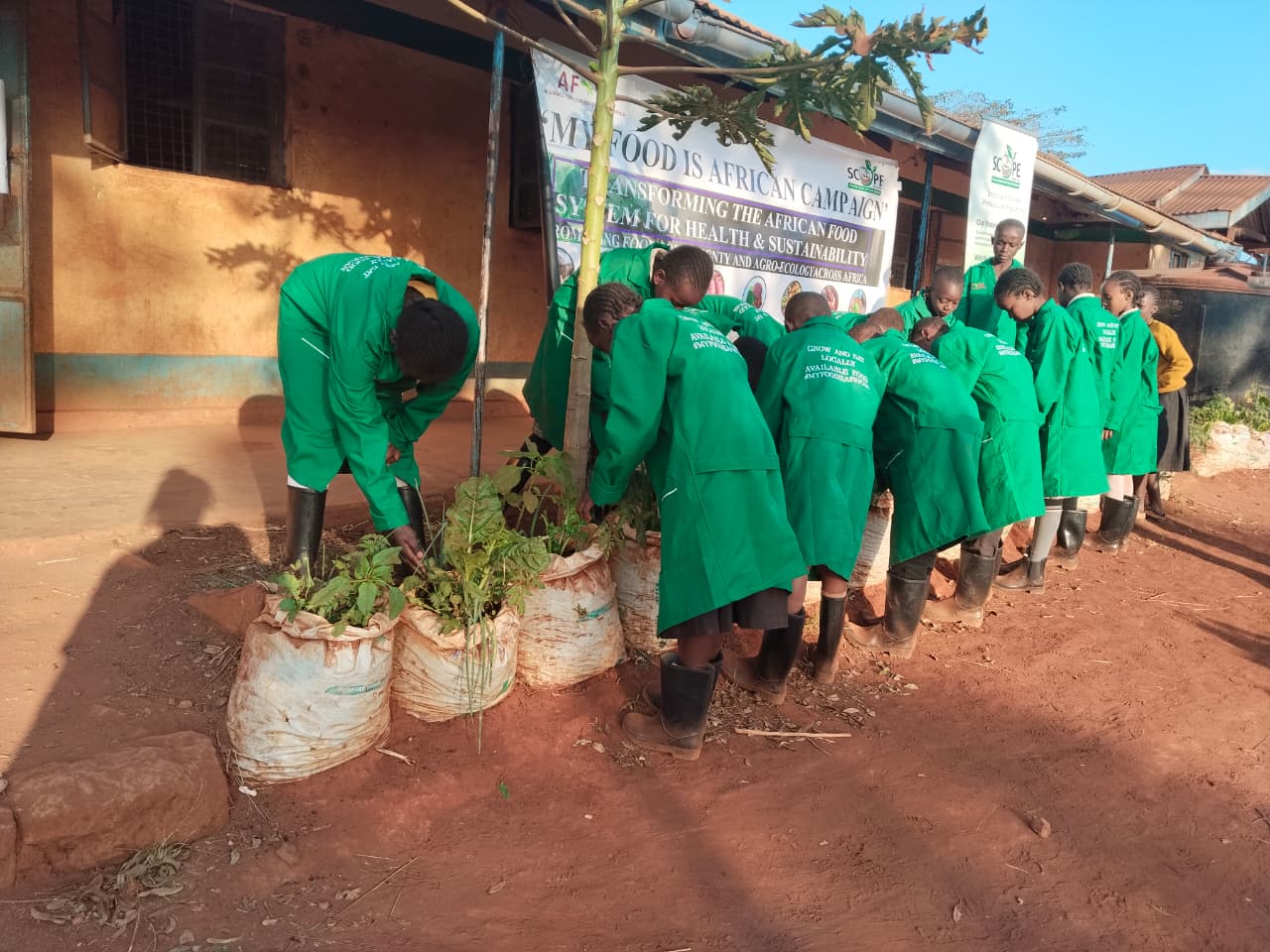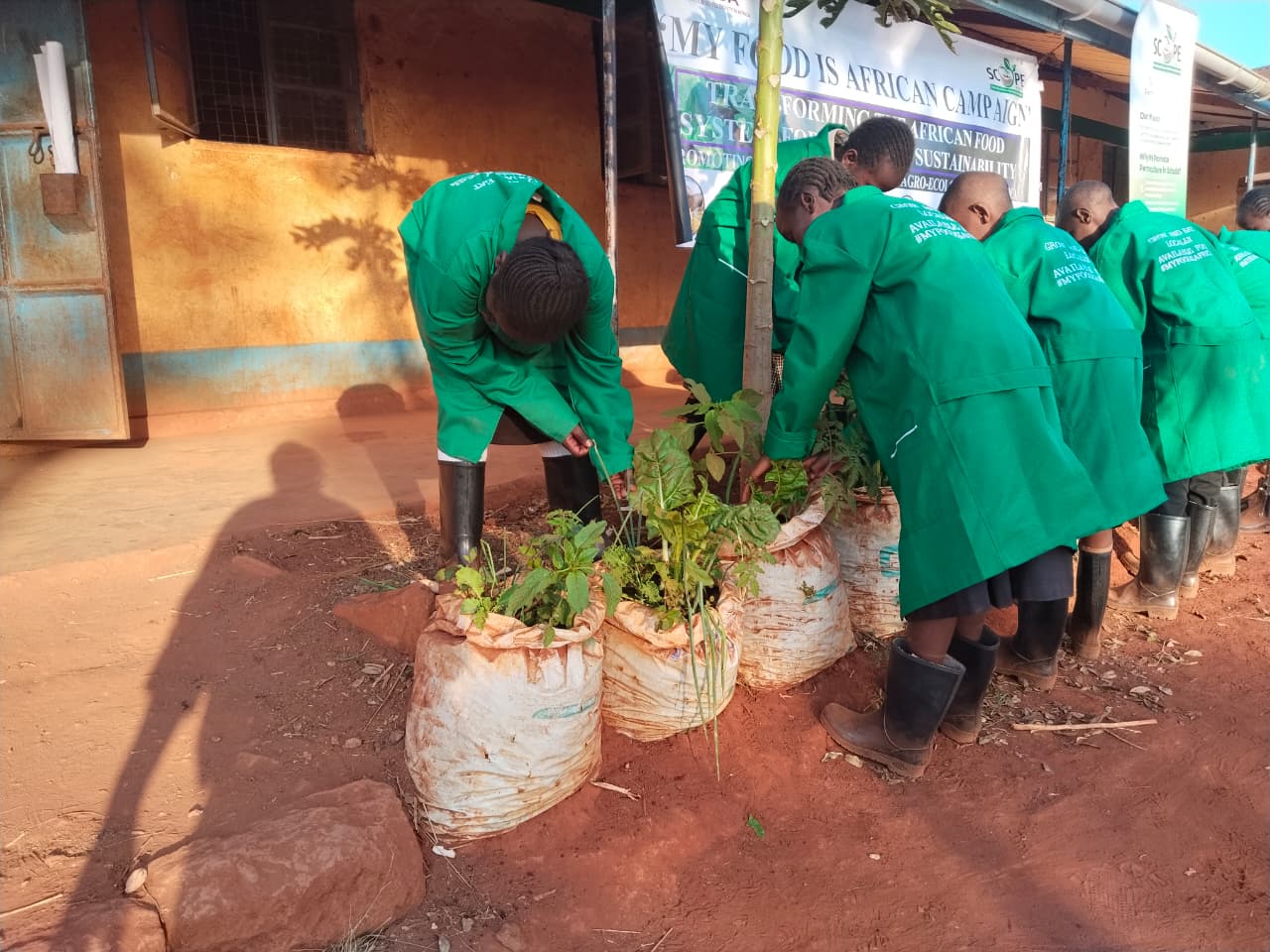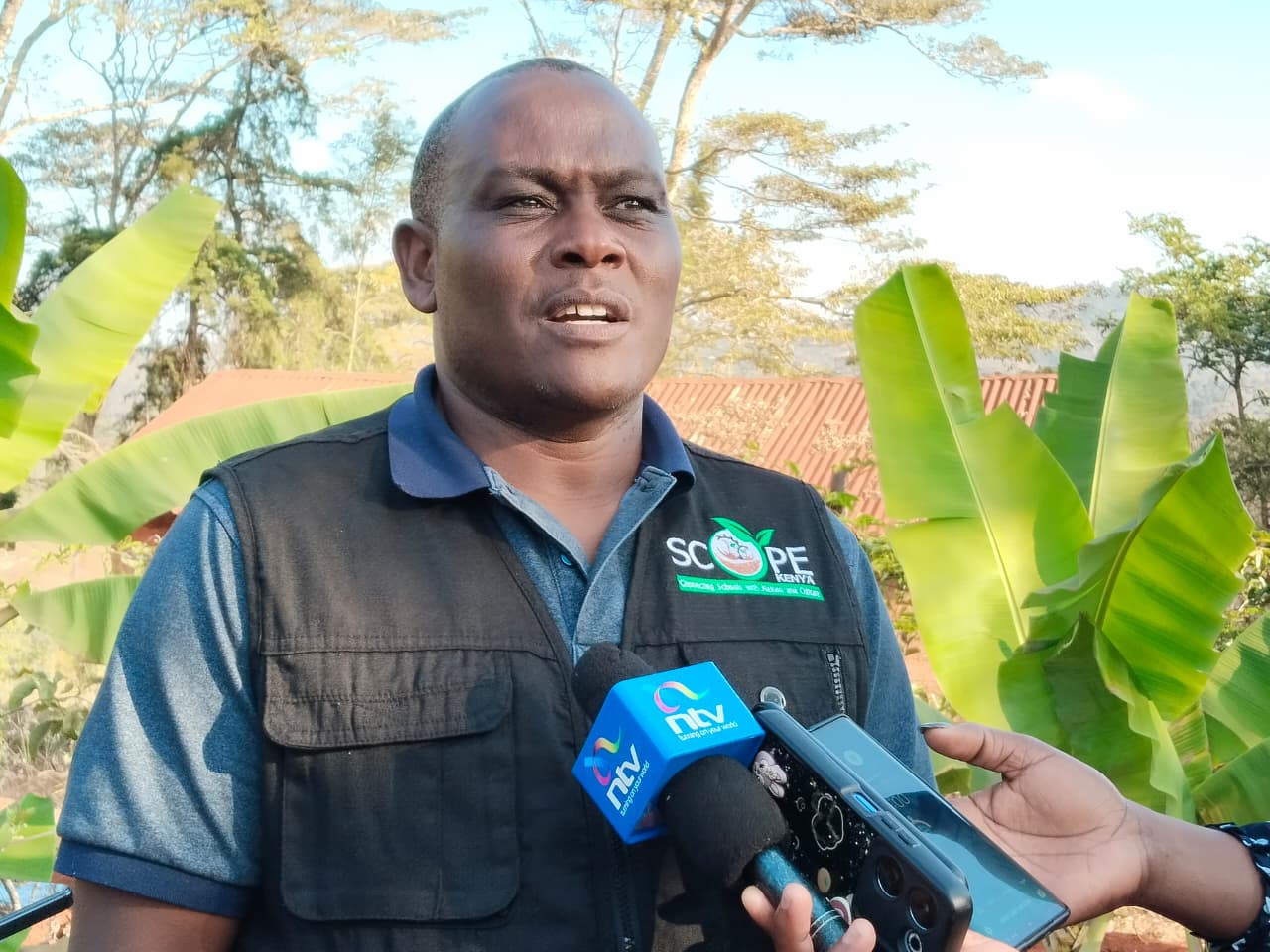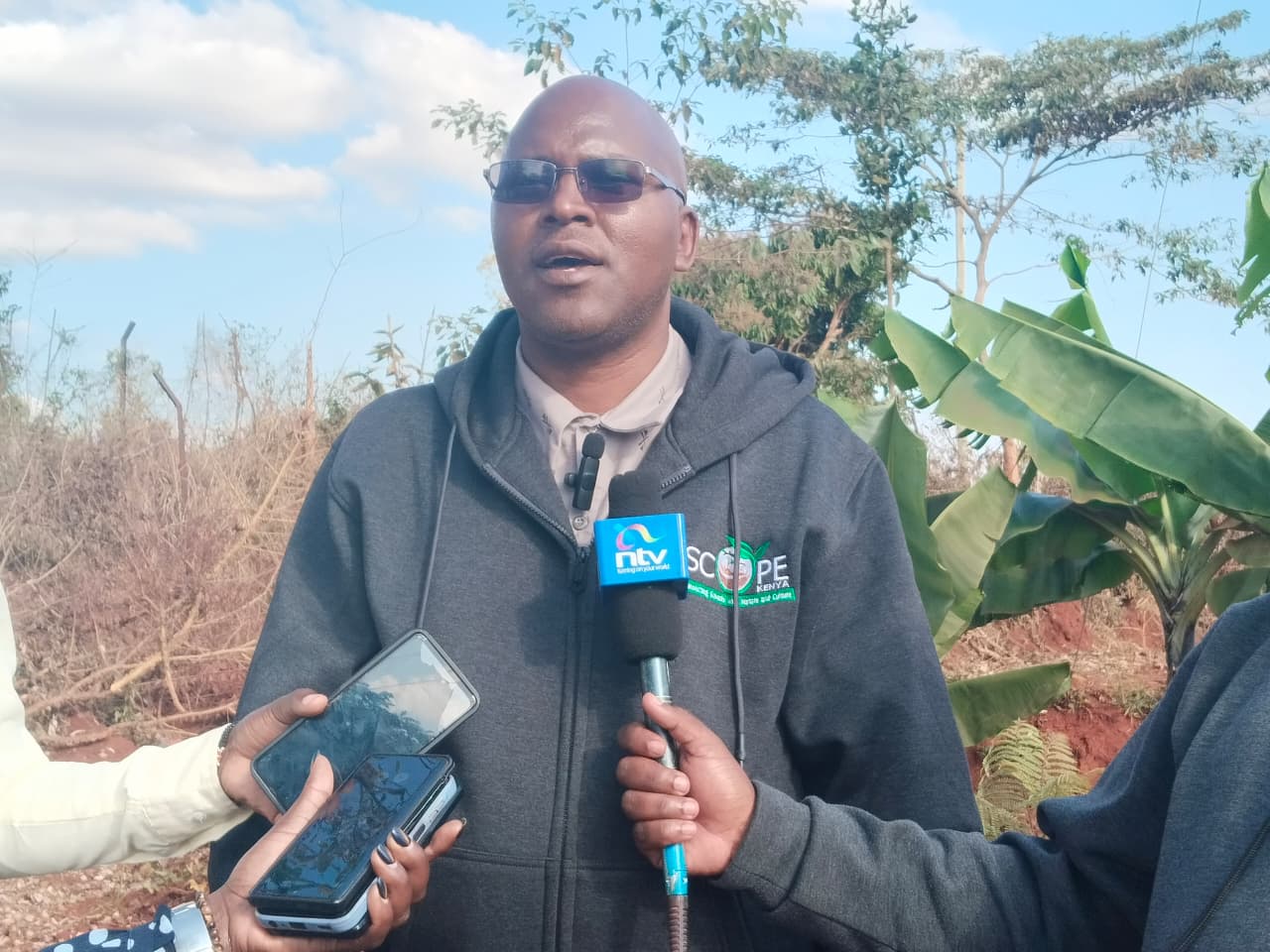 Students at Kivai Comprehensive School in Makueni subcounty tend to their vegetables within the school compound /FAITH MATETE
Students at Kivai Comprehensive School in Makueni subcounty tend to their vegetables within the school compound /FAITH MATETEWhen children walk through the gates of Kivai Comprehensive School in Makueni subcounty, they are greeted not by dust or bare ground, but by thriving rows of spinach, tomatoes, onions and indigenous vegetables.
The entrance, once desolate, now bursts with life—a symbol of promise for learners who know that even if they arrive from home on empty stomachs, there will be food waiting for them.
“We designed the school entrance this way so that learners arrive in an environment that is friendly and promising,” explains head teacher Eliud Mutungi.
“Even if some children come without food, they know that here they might be provided for. Whenever the vegetables are ready, we normally cook for them.”
 Students at Kivai Comprehensive School in Makueni subcounty tend to their vegetables within the school compound/ FAITH MATETE
Students at Kivai Comprehensive School in Makueni subcounty tend to their vegetables within the school compound/ FAITH MATETEThis transformation is the fruit of Scope Kenya’s permaculture programme, introduced in Kivai in 2023. Permaculture is a land management and settlement design approach that mimics the patterns and relationships found in flourishing natural ecosystems.
What started as a pilot has grown into a model showing how schools in semi-arid regions can fight hunger, boost learning and nurture resilience.
Before the programme, Kivai’s grounds were dry, learners lacked confidence and academic performance lagged.
The turning point came when head teachers in the area were invited for permaculture training. After presenting their readiness, Kivai was selected as a pioneer school.
“Before this programme, our school was unfriendly and learning was greatly affected,” Mutungi recalls.
“But after introducing permaculture, everything changed. Confidence went up and performance improved.”
The results are striking. In 2023, Kivai topped the subcounty in KCPE exam results. Enrolment more than doubled, from 64 pupils to 141, as parents transferred their children from neighbouring schools.

“The gardens have made the school so attractive,” Mutungi says, adding that parents want their children to be part of the success.
Teachers say permaculture blends seamlessly with Kenya’s Competency-Based Curriculum. Agriculture lessons take pupils into the gardens to practice what they learn, while science classes study soil and plant life in real time, and mathematics lessons calculate crop yields and sales. During holidays, the produce is sold to sustain the project.
“After playing, the children return to the gardens to continue their work. It’s teaching them to be accountable,” teacher Benjamin Kivilu says. “This is education for life.”
Even at home, the ripple effect is visible as pupils have started kitchen gardens and livestock projects with their families.
The impact is most obvious at lunchtime. Where once children struggled with hunger, today they enjoy balanced meals grown on the school grounds.
“We provide proteins from beans, carbohydrates from cassava and sweet potatoes and vitamins from leafy greens,” Mutungi says.
“We even make hibiscus tea from plants grown here.”
Early childhood teacher Rebecca Mbevi says learners are healthier and more focused in class.
“Previously, some children were malnourished while others suffered from obesity. Today, you can see the difference,” she says.
Parents, too, have embraced the change, adopting organic farming at home, saving money and improving family diets.
“When you visit homes around here, you will find families practising what started at school,” Mbevi says.
“We realised it’s better to depend on crops that don’t require chemicals. We now save money and even make extra income.”
At the heart of the programme is permaculture—a holistic farming system that emphasises sustainability and harmony with nature
“No chemicals, no synthetic fertilisers, no insecticides,” Mutungi explains.
 Kivai Comprehensive School headteacher Eliud Mutungi /FAITH MATETE
Kivai Comprehensive School headteacher Eliud Mutungi /FAITH MATETE
“Everything is organic. The plants support one another naturally.”
Intercropping repels pests and boosts
soil fertility, banana circles capture rainwater and compost pits recycle
waste into manure. The result is food that is nutritious and flavourful.
“Our sukuma wiki has a
natural and pleasant flavour. The children love it,” Mutungi says.
John Macharia, national coordinator
of Scope Kenya, says the programme is about more than farming.
“For us, it’s a whole-school transformation. We are teaching children practical life skills, helping schools save on food costs, and at the same time greening the environment.”
He notes the model adapts to local resources, from rainwater harvesting to composting kitchen waste.
“Even schools in water-stressed regions can still
thrive.”
He emphasises the multiple benefits:
feeding learners, improving attendance and instilling environmental
stewardship.
“We have seen schools where absenteeism dropped drastically because children are assured of a nutritious meal.
Parents also support these gardens because they see their children learning skills that can be applied back home.
For Macharia, this is not
charity but a model of sustainability.
“Our role is to plant the seed of
knowledge and provide initial support. But once schools and parents take
ownership, the programme becomes self-sustaining. That’s why we see it as a
movement rather than a project.”
Today, Scope works with 140 schools
across 15 counties, with Kivai standing out as a beacon of possibility. Yet challenges
remain, chief among them water scarcity. Makueni is semi-arid and rainfall is
unreliable.
Techniques like mulching and water
harvesting help, but demand still outpaces supply.
A 10,000-litre tank costs around
Sh3,500, beyond the reach of many parents, so the school sometimes relies on
donations or water pumped from far-off rivers. Learners themselves have stepped
in.
“Some pupils asked their parents to let them
use donkeys to fetch water,” Mutungi says.
“Each donkey brings about four 20-litre jerrycans, and we now have about five donkeys supplementing our supply. Thanks to this, we water the gardens at least three times a week.”
Still, more is needed. “If we had a borehole, this programme could run all
year. Our soils are fertile. The missing link is water.”
As the afternoon sun beats down on
Kivai’s gardens, children laugh and chase one another between rows of
vegetables, some stopping to water seedlings or pluck weeds. For them, the
garden is more than a source of food—it is a classroom, a playground, and a
symbol of resilience. “This programme has given our learners dignity, health and hope,” Mutungi says, surveying the fields with quiet pride.
“It has taught them to care for the
earth, to work with their hands and to value food. These are lessons that will
stay with them for life.”
For a school once struggling with
hunger and low enrolment, the story of Kivai is proof that with the right seeds
of knowledge, community, and care, even the driest grounds can bloom.

















